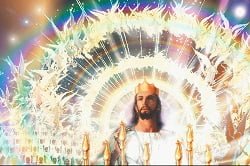Friday: Further Study: The Heavenly Sanctuary
Further Study: “Paul had a view of heaven, and in discoursing on the glories there, the very best thing he could do was to not try to describe them.
He tells us that eye had not seen nor ear heard, neither hath it entered into the heart of man the things which God hath prepared for those that love Him. So you may put your imagination to the stretch, you may try to the very best of your abilities to take in and consider the eternal weight of glory, and yet your finite senses, faint and weary with the effort, cannot grasp it, for there is an infinity beyond. It takes all of eternity to unfold the glories and bring out the precious treasures of the Word of God.”—Ellen G. White, The SDA Bible Commentary, vol. 6, p. 1,107.
“The abiding place of the King of kings, where thousand thousands minister unto Him, and ten thousand times ten thousand stand before Him (Daniel 7:10); that temple, filled with the glory of the eternal throne, where seraphim, its shining guardians, veil their faces in adoration, could find, in the most magnificent structure ever reared by human hands, but a faint reflection of its vastness and glory. Yet important truths concerning the heavenly sanctuary and the great work there carried forward for man’s redemption were taught by the earthly sanctuary and its services.”—Ellen G. White, The Great Controversy, p. 414.
Discussion Questions:
- Look at the last quote in Friday’s study from Ellen G. White. What does she mean when she says that many “important truths” for our salvation were taught in the earthly sanctuary and its services? What are some of those truths, and why are they important?
- What does it mean that God “dwells” in heaven? How do you understand that concept?
- This week’s lesson touched on the idea that the onlooking universe sees the work that God is doing in behalf of humanity. Why is that a crucial concept to grasp? How does this concept help us to understand The Great Controversy motif and what that motif means in the whole plan of salvation? What does it tell us about the character of God that He would leave His ways open to the scrutiny of beings that He, Himself, created?


when paul said the eye have not seen it neither the ears hear it it really shows that we must not lose our salvation because of worldly richies ; infact what thing is good here on earth is just but dug as compared to what heaven have in store for us. lawrence mupatsi bulawayo pelandaba church
I thank God for this quarter’s lesson. Please shed some light about the truths in the earthly sanctuary and how they are linked to our salvation
Adding to the last question: What does it say about God when He allows His creation to judge what He has already judged. What does it mean when Paul says, “Do you not know that we shall judge angels?” (1 Cor 6:3 NKJV) or that heavenly beings are judging us in the investigative judgment? Who is everybody actually judging and why does God allow it?
Both Daniel and John state that judgment was given to the saints, or the resurrected ones (Dan. 7:22; Rev. 20:4). In Revelation 20 the word “judgment” is from the Greek word krima, which generally means “sentence,” “verdict,” or “a decision rendered.” Here krima seems to mean the authority to pass sentence. The passage does not refer to a verdict in favor of the righteous. In the Septuagint of Daniel, the word for “judgment” is krisis, the “act of judging”; but in the Theodotion Greek version it is rendered krima. The work of judgment referred to by the revelator is doubtless that spoken of by the apostle Paul: “Do ye not know that the saints shall judge the world? . . . Know ye not that we shall judge angels?” (1 Cor. 6:2, 3). The work of judgment may well involve a careful investigation of the records of evil men and a decision regarding the amount of punishment due each sinner for his part in the rebellion against God.